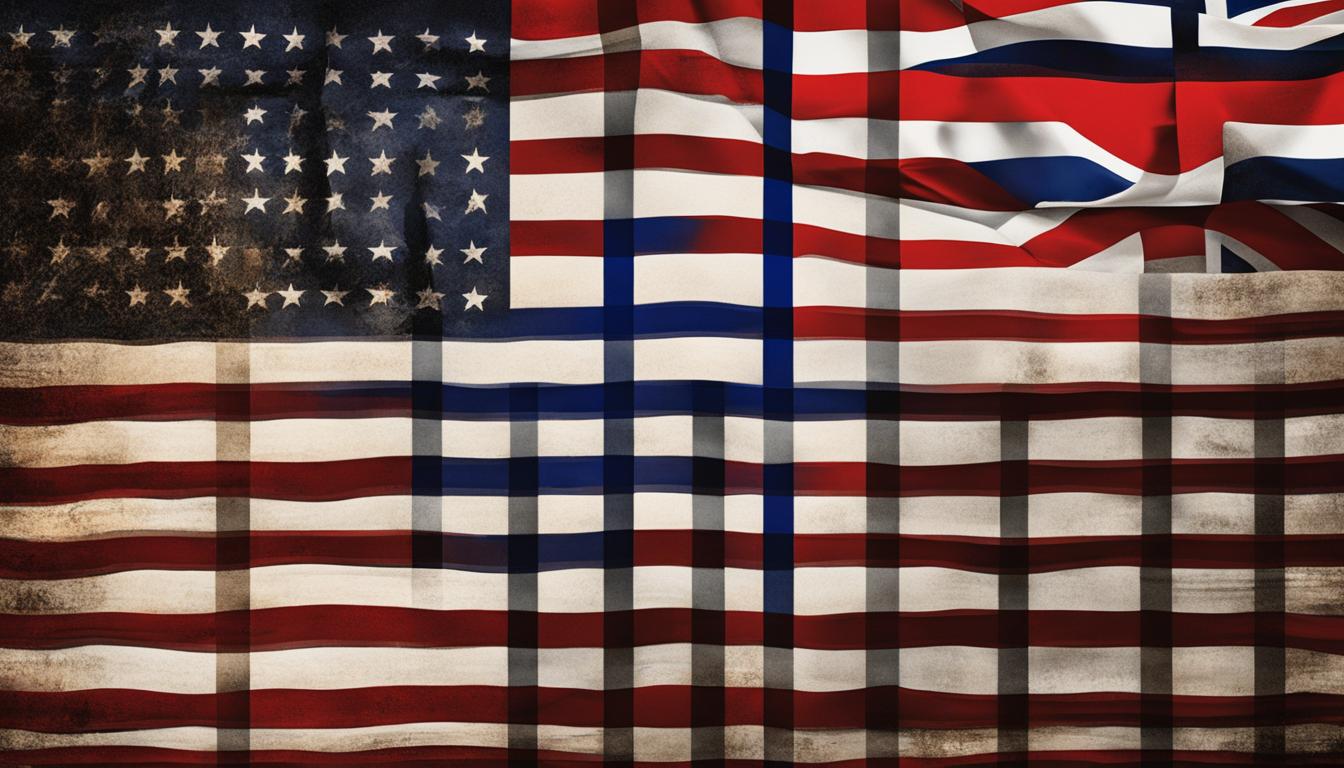As we delve into the historical events surrounding the War of 1812, it becomes clear that this conflict was not sparked by a single cause alone. Rather, a complex web of factors and tensions led to the eruption of hostilities between the United States and Great Britain. In this article, we will examine the key drivers behind this significant moment in American history.
Key Takeaways
- The War of 1812 was triggered by a combination of factors, including American westward expansion, British trade restrictions, impressment of American sailors, and the desire to protect Native American territory.
- Native American resistance, led by influential leaders like Tecumseh, played a crucial role in the conflict.
- The war had a profound impact on Native American peoples, leading to further territorial growth for the United States and the ceding of Native lands.
- The United States went to war with divergent objectives and emerged without a clear outcome.
- The War of 1812 is a testament to the complexities of international relationships and the struggle for power in North America.
Now, let’s delve deeper into the causes and consequences of the War of 1812, as we unravel the mysteries that lie behind this pivotal event in American history.
Aggressive Westward Expansion and Native American Resistance
The origins of the War of 1812 can be traced back to the aggressive westward expansion of the United States and the resistance of Native American tribes. As the young American nation sought to expand its territory, it posed a constant threat to the ancestral lands of Indigenous peoples. In an effort to protect their homelands, many Native Americans joined forces with the British during the war.
One of the most influential Native American leaders during this time was Tecumseh, the Shawnee Chief. Tecumseh recognized the dangers posed by white westward expansion and sought to unite Indian tribes against the encroaching settlers. He founded Prophetstown, an Indigenous village that served as a rallying point for Native resistance.
Tecumseh’s Role in Native American Resistance
Tecumseh’s charismatic leadership and persuasive recruitment efforts attracted warriors from more than a dozen nations to join the fight against American forces. His alliance with the British was a significant factor in the War of 1812, as the Native American resistance presented a formidable challenge to the United States.
The aggressive westward expansion of the United States and the resistance of Native American tribes played a crucial role in the events leading to the War of 1812. The desire to protect ancestral lands and the leadership of figures like Tecumseh set the stage for a conflict that would have far-reaching consequences for both Indigenous peoples and the United States.
British Trade Restrictions and Impressment
One of the key factors that led to the War of 1812 was the imposition of trade restrictions by the British on the United States. In an effort to weaken France during the Napoleonic Wars, the British implemented measures to restrict American trade with France and French colonies. These restrictions greatly impacted American merchants and their ability to conduct business.
Furthermore, the impressment of American sailors into the British Royal Navy further fueled tensions between the two nations. British naval forces would forcibly seize American sailors and force them to serve in the British Navy, regardless of their citizenship. This practice, which violated American sovereignty and angered the American public, became a major catalyst for the declaration of war.
“The impressment of our seamen is a flagrant violation of the rights and independence of the United States.”
– President James Madison
The combination of trade restrictions and impressment created a significant strain on Anglo-American relations. These actions by the British government were seen as clear violations of American sovereignty and led to a growing sentiment among Americans that war was necessary to protect their rights and honor.
| British Trade Restrictions | Impressment of American Sailors |
|---|---|
| Restricted American trade with France and French colonies | Forcibly seized American sailors to serve in the British Navy |
| Impacted American merchants and economy | Violated American sovereignty and angered the public |
| Strengthened anti-British sentiment in the United States | Contributed to the decision to declare war |
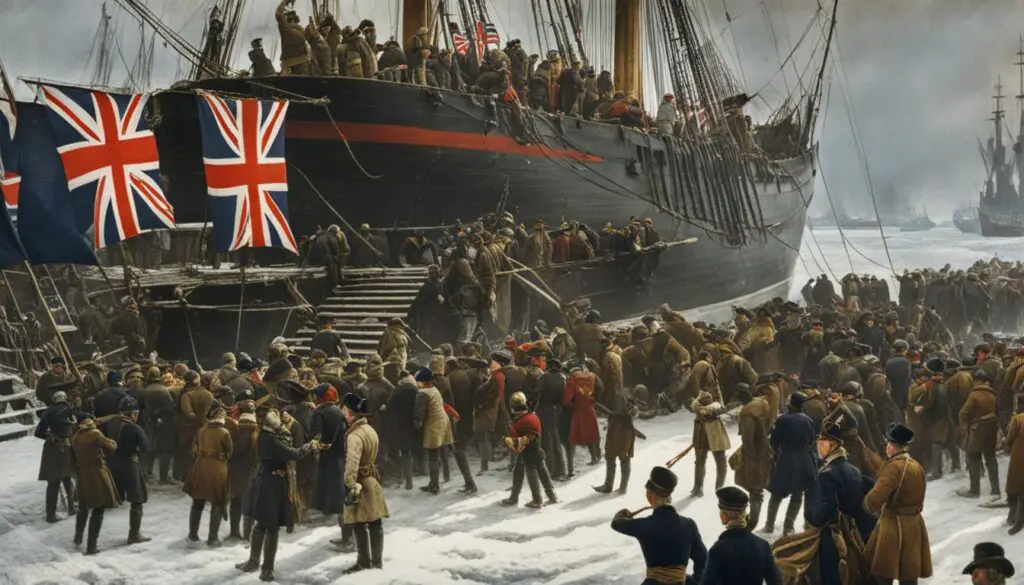
Effects of British Trade Restrictions and Impressment
The British trade restrictions and impressment of American sailors had profound effects on the United States. These actions further fueled anti-British sentiment in the country and contributed to the decision to declare war. The War of 1812, which followed, had significant impacts on both nations and shaped the course of American history.
On one hand, the war provided an opportunity for the United States to assert its sovereignty and defend its honor against British aggression. It also marked a turning point in American identity and solidified the nation’s commitment to its own interests.
However, the war also highlighted the challenges faced by the young American nation and the complexities of international conflicts. The United States went to war with unclear objectives and divided loyalties, resulting in a lack of a definitive outcome at the end of the war. Nevertheless, the British trade restrictions and impressment played a crucial role in the events that led to the War of 1812.
British Concerns about U.S. Territorial Growth and Indian Allies
During the War of 1812, Great Britain had several key concerns regarding U.S. territorial expansion and its alliance with Indigenous tribes. As the young American nation rapidly expanded westward, Britain saw this as a threat to its remaining colonial foothold in North America. The British feared losing control of Canada and sought to protect Indian territory as a buffer against U.S. aggression.
By supporting a militant tribal coalition along the Great Lakes frontier, the British aimed to impede American expansion and maintain their influence in the region. This alliance posed significant challenges for the United States during the war. British military assistance to the Indigenous tribes along with their own troops further escalated tensions and contributed to the outbreak of conflict.
To gain a better understanding of the British concerns, it is crucial to examine the context of the time. Great Britain was engaged in a long struggle against Napoleonic France and viewed American aggression as a clear violation. Despite their military engagements in Europe, the British and their Canadian allies were able to defend Canada against American invasion attempts and maintain control throughout the war.
| Key Factors | Impact |
|---|---|
| U.S. territorial expansion | Threatened British control in North America |
| Indian allies | Challenged American forces and impeded expansion |
| Buffer against U.S. aggression | Protected British interests and influenced territorial outcomes |
The British concerns about U.S. territorial growth and their support of Indigenous allies were key factors that impacted the course of the war. These factors further escalated tensions between the United States and Britain, underlining the complex nature of the conflict and its origins.
Tecumseh and Native American Resistance
Tecumseh, the Chief of the Shawnee, was a pivotal figure in the Native American resistance against white westward expansion during the War of 1812. With his leadership and strategic vision, he played a significant role in uniting tribes and rallying Indigenous warriors to defend their ancestral lands. Tecumseh’s efforts were driven by a deep desire to protect Native American sovereignty and halt the encroachment of white settlers.
One of Tecumseh’s most notable achievements was the establishment of Prophetstown, an Indigenous village located in present-day Indiana. This village served as a gathering place for tribes from various nations, providing a platform for Tecumseh to unite them against the advancing American forces. Tecumseh’s charismatic leadership and impassioned recruitment efforts attracted warriors from more than a dozen tribes, creating a formidable Indigenous resistance.
Throughout the war, Tecumseh and his Native American allies actively engaged in battles against American forces. Their contributions were instrumental in key campaigns, including the Battle of the Thames in 1813. Tecumseh’s alliance with the British further bolstered the Indigenous resistance and posed a significant challenge to the American military.
The Legacy of Tecumseh and Native American Resistance
The legacy of Tecumseh and the Native American resistance during the War of 1812 continues to resonate today. Although the conflict did not result in a definitive victory for the Indigenous peoples, their courageous stand against white expansion and their efforts to protect their cultural heritage remain an integral part of Native American history.
The war’s aftermath marked a turning point for Native American tribes, as the United States accelerated its territorial expansion through treaties. These agreements often resulted in the ceding of Native lands and the forced relocation of tribes to reservations. The impact of the war on Native nations is still felt today, as they continue to fight for their rights, sovereignty, and cultural preservation in the face of ongoing challenges.
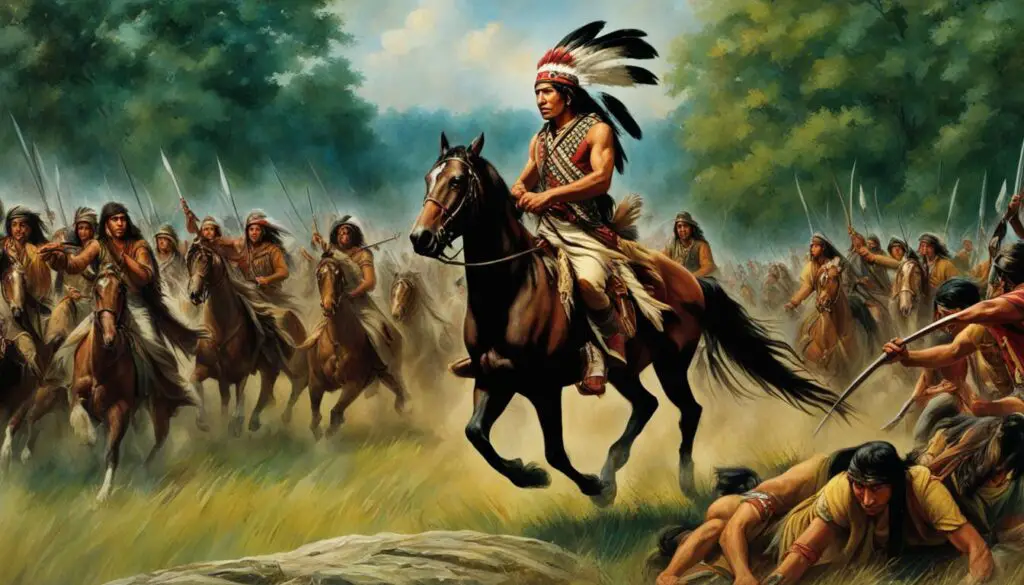
| Tecumseh and Native American Resistance | Highlights |
|---|---|
| Tecumseh’s role | Chief of the Shawnee, leader of Native American resistance against westward expansion |
| Prophetstown | Indigenous village founded by Tecumseh to unite tribes against white settlers |
| Indigenous warriors | Joined Tecumseh’s cause from over a dozen tribes |
| Engagement in battles | Active participation in key campaigns, including the Battle of the Thames |
| Legacy and impact | Continued fight for Native American rights, sovereignty, and cultural preservation |
The Role of Indian Allies in the War
The War of 1812 witnessed the participation of Indian tribes as key allies in various battles. Their alliance with the British and their involvement in crucial campaigns played a significant role in shaping the outcome of the war. One prominent example was the leadership of Tecumseh, the Chief of the Shawnee tribe, who rallied Indigenous warriors and united tribes against American forces.
The support of Indian tribes bolstered Canada’s military strength and posed a formidable challenge to the American troops. Tecumseh’s forces, consisting of warriors from more than a dozen nations, were instrumental in several battles, including the Battle of Thames.
| Indian Allies in the War | Significance |
|---|---|
| Tecumseh’s forces | Provided additional manpower for Canada |
| Participation in the Battle of Thames | Inflicted a major defeat on American forces |
| Native American support | Contributed to the overall outcome of the war |
The Indian tribes’ involvement in the conflict reflected their desire to protect their ancestral lands and resist white westward expansion. By aligning themselves with the British, they saw an opportunity to defend their territories and maintain their way of life. Despite the eventual defeat of the British and their Indian allies, the role played by Indigenous peoples during the War of 1812 remains a significant aspect of the conflict.
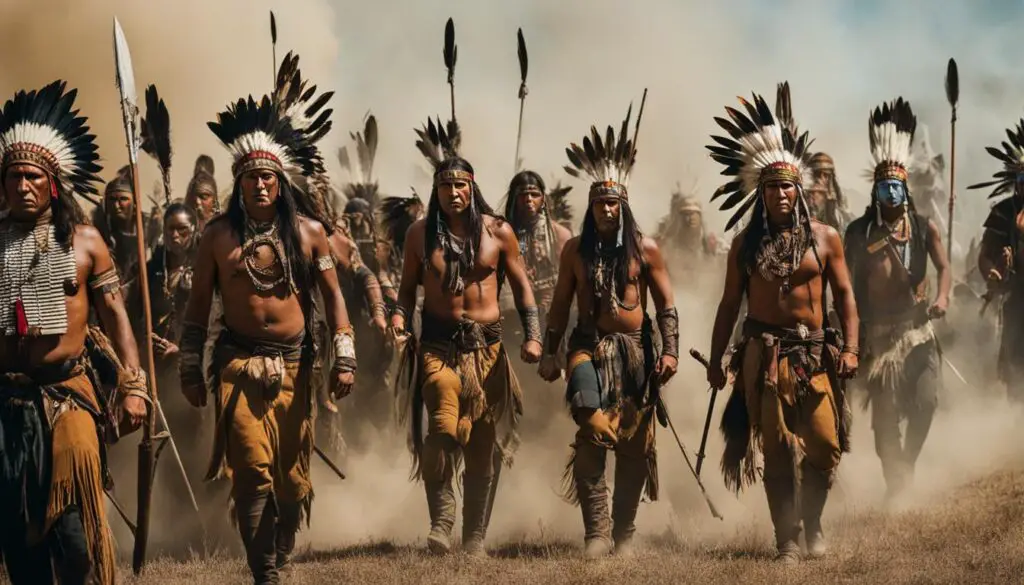
In conclusion, the War of 1812 witnessed the crucial participation of Indian tribes as allies of the British. Their involvement in various battles, led by leaders like Tecumseh, added strength to the British forces and posed a significant challenge to the United States. The support of Indian tribes proved instrumental in shaping the outcome of the war and their role in defending their ancestral lands remains an important aspect of the conflict’s legacy.
American Motivations and Objectives
The War of 1812 was a complex conflict with various motivations and objectives on the part of the United States. The young American nation went to war with divided loyalties and uncertain goals, which ultimately contributed to the lack of a definitive outcome at the end of the conflict.
Some American politicians, known as “war hawks,” saw the war as an opportunity to conquer Canada and expand American territory. These individuals believed in the doctrine of Manifest Destiny and sought to assert American dominance in North America. On the other hand, there were those who aimed to defend American honor against British aggression. The British had imposed trade restrictions on the United States and engaged in the impressment of American sailors into the British Royal Navy, which angered many Americans.
The complexities of the conflict and the lack of a clear, unified objective left the United States without a decisive victory. The war was marked by a series of military setbacks and strategic miscalculations on both sides. With no clear path to victory, the United States eventually agreed to end the war with the signing of the Treaty of Ghent in 1814.
“The United States went to war with confused objectives and divided loyalties. However, the complexities of the conflict and the lack of a clear, unified objective left the United States without a definitive outcome at the end of the war.”
Despite the inconclusive outcome, the War of 1812 had lasting effects on American history. It furthered the territorial growth of the United States, as the end of the war accelerated the country’s westward expansion through treaties. Additionally, the war highlighted the need for a stronger military and a united sense of national identity.
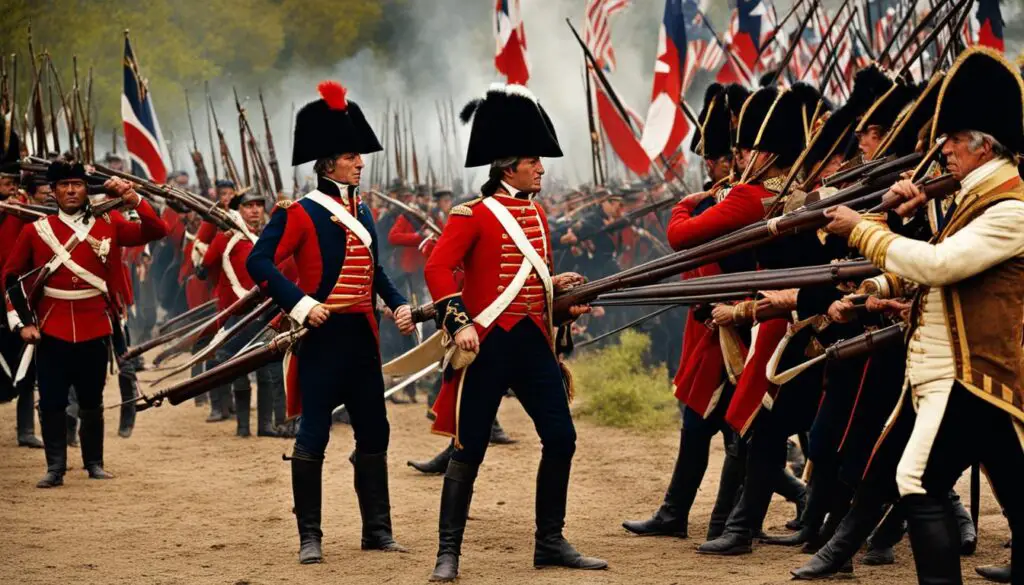
| Key American Motivations and Objectives |
|---|
| Conquer Canada and expand American territory |
| Defend American honor against British aggression |
| Challenge British trade restrictions and impressment of American sailors |
| Assert American dominance in North America |
| Secure a stronger military and foster a united sense of national identity |
British Perspectives and the Defense of Canada
The War of 1812 was not only a conflict between the United States and Great Britain, but also an extension of the broader struggle between Britain and Napoleonic France. From the British perspective, American aggression was seen as a violation and a threat to their remaining colonial foothold in North America. Defending Canada became a crucial objective for the British, who sought to protect their interests and maintain control over the territory.
The British faced significant challenges in defending Canada, as they were engaged in ongoing military operations in Europe. Despite their limited military assistance, they were able to resist American advances and effectively defend the territory throughout the war. The British forces, along with their Canadian allies, successfully repelled American invasion attempts and maintained control over Canada.
“The defense of Canada was of paramount importance for the British. They saw the American aggression as a threat to their colonial interests and were determined to protect Canada at all costs.” – British General John Sherbrooke
While the British were ultimately successful in defending Canada, the War of 1812 did have lasting impacts on the region. The conflict led to a significant increase in tensions between the United States and Canada, and it set the stage for future confrontations between the two nations. The war also highlighted the vulnerabilities of British North America and led to increased efforts to fortify and defend Canadian territory in the years that followed.
Overall, the British perspective on the war emphasized the defense of their interests and the need to protect Canada from American aggression. The conflict was closely tied to their ongoing struggle against France, and while the British faced challenges in defending Canada, they ultimately emerged victorious in maintaining control over the territory.
The Legacy of the War and Native American Impact
The War of 1812 had a lasting impact on Native American nations, shaping their struggle for sovereignty and land rights. While the conflict marked a turning point in Native resistance, the end of the war brought significant changes to their communities. The United States accelerated its territorial expansion through treaties, resulting in the ceding of Native lands and the creation of reservations.
One of the key figures in Native American resistance was Tecumseh, the Chief of the Shawnee. Tecumseh founded Prophetstown, an Indigenous village aimed at uniting tribes against the invading white settlers. His charismatic leadership and impassioned recruitment efforts attracted warriors from more than a dozen nations to join the fight against American forces.
Despite the contributions of Native American tribes, the outcome of the war did not bring about their desired goals. The war’s aftermath led to further encroachment on Native lands and the displacement of their communities. This legacy continues to impact Native peoples to this day.
The Impact on Native American Communities
The War of 1812 resulted in the loss of Native American territory and the disruption of their way of life. As the United States sought to expand its borders, Native nations faced increasing pressure to cede their lands through treaties. These agreements often lacked proper representation and were coerced by the United States government.
Furthermore, the war weakened Native American alliances with the British. After Tecumseh’s death in 1813, the Native resistance movement lost its central figure and struggled to maintain cohesion. The end of the war saw the dissolution of Prophetstown and the dispersal of Native communities.
The Creation of Reservations
As the United States continued to expand, Native American tribes were forced onto reservations, isolated from their ancestral lands and resources. These reservations often lacked adequate resources and opportunities for economic growth. The displacement and confinement of Native peoples contributed to the loss of cultural traditions, language, and identity.
Despite the hardships faced by Native American communities, their resilience and cultural preservation efforts continue to shape the fabric of American society. It is essential to acknowledge and honor the historical and ongoing contributions of Native peoples, while also addressing the injustices and inequalities resulting from the War of 1812 and subsequent policies.
| Effects of the War of 1812 on Native American Communities |
|---|
| Loss of Native American territory through coerced treaties |
| Dissolution of Native American alliances with the British |
| Weakening of Native American resistance movements |
| Forced relocation and creation of reservations |
| Loss of cultural traditions and identity |
Conclusion
The War of 1812 was a complex conflict with various factors that led to its outbreak. The aggressive westward expansion of the United States, British trade restrictions, impressment of American sailors, and the desire to protect Native American territory all played significant roles in fueling the tensions between the United States and Great Britain.
Native American resistance, spearheaded by influential leaders like Tecumseh, further complicated the situation as they formed alliances with the British to fight against the encroachment of white settlers on their lands. These alliances added another layer to the conflict and significantly impacted the outcomes of battles throughout the war.
While the war had profound effects on Native American nations, the United States ultimately achieved its objective of expanding its territorial control. However, the war did not resolve the underlying issues that prompted its outbreak, and the conflicts between the two nations persisted in different forms even after the war ended.
FAQ
What were the causes of the War of 1812?
The War of 1812 had multiple causes, including the aggressive westward expansion of the United States, British trade restrictions and impressment of American sailors, the desire to protect Native American territory, and British concerns about U.S. territorial growth.
How did Native American resistance play a role in the war?
Seeking military allies, many Native Americans fought alongside the British during the war. Tecumseh, the Shawnee leader, played a crucial role in rallying Indian warriors and uniting tribes against white westward expansion.
What were the British trade restrictions and impressment?
The British imposed trade restrictions on the United States to prevent the country from supporting France in their war against Britain. Additionally, British impressment involved forcefully recruiting American sailors into the British Royal Navy.
Why did the British have concerns about U.S. territorial growth?
Great Britain saw U.S. territorial growth, particularly towards Canada, as a threat to its remaining colonial foothold in North America. They sought to protect Indian territory as a buffer against U.S. aggression and had already shown support to a militant tribal coalition along the Great Lakes frontier.
What role did Tecumseh play in Native American resistance?
Tecumseh, the Chief of the Shawnee, founded Prophetstown, an Indigenous village aimed at uniting tribes against invading white settlers. His leadership and recruitment efforts attracted warriors from more than a dozen nations to join the fight against American forces.
How did Indian allies contribute to the war?
Indian tribes, including those led by Tecumseh, played a significant role in many battles of the War of 1812. Their alliance with the British and participation in campaigns posed a challenge to the American forces and provided Canada with additional manpower.
What were the motivations and objectives of the United States?
The United States had divided loyalties and unclear objectives during the war. Some politicians sought to conquer Canada and expand American territory, while others aimed to defend American honor against British aggression.
How did the British view the war?
From the British perspective, the war was an extension of their struggle against Napoleonic France. They viewed American aggression as a violation and defended Canada against American invasion attempts, despite their limited military assistance due to engagements in Europe.
What was the impact of the war on Native Americans?
The war had profound effects on Native American nations. While Tecumseh’s death marked a turning point in Native resistance, the end of the war resulted in accelerated U.S. territorial expansion through treaties, leading to the ceding of Native lands and the creation of reservations.
What were the overall causes and outcomes of the war?
The War of 1812 had multiple causes, including westward expansion, trade restrictions, impressment, and Native American alliances. However, the war ended without resolving the issues that initially led to its outbreak.
Source Links
- https://www.history.com/news/war-of-1812-native-americans-tecumseh
- https://history.army.mil/books/amh/amh-06.htm
- https://history.army.mil/books/amh-v1/ch06.htm
